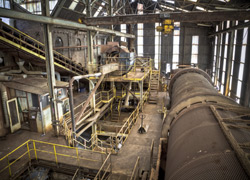Germany’s Trade Surplus Shrinks As The UK Posts Poor Trade And Production Results
You have to wonder if the UK government and various business journalists have been premature in calling the UK’s recession over and suggesting that the UK is in a pattern of growth. Technically the UK recession is over and revisionist ONS figures actually erased the infamous ‘double-dip’ from the records. However, the recovery (if it exists) is incredibly fragile and politicians crowing over it, or using it as a weapon to criticize others’ policies, may want to roll back their arrogance. Production in the UK has decreased by 1.6% year on year, whilst the balance of payments deficit has almost trebled.
The “march of the makers”, that the UK chancellor thought he’d identified, is looking more of a shoulders slumped shuffling around in circles and there’s one very sobering figure illustrating just how far the UK has to travel to get back to any sense of normality where the manufacturing figure is concerned; the UK’s manufacturing numbers are still 11% below where they were in 2007…
Germany’s exports suddenly drops
German exports dropped by 1.1 % in July, economists expected a 0.8% rise. Imports rose by 0.5%. The German surplus narrowed to €14.5bn, from €15.8bn in June. France’s trade deficit widened to €5.109bn in July, from €4.484bn in June. The French Customs Office blamed higher energy costs and increased supply costs for its aerospace industry.
Britain’s trade deficit doubled in July, whilst industrial production failed to grow as expected. The data was unexpected for the UK after recent strong economic statistics suggesting that the recovery would be sustained.
The UK trade deficit in goods and services widened to £3.085bn, the worst monthly reading witnessed since October 2012. This figure was twice as wide as June’s figure, suggesting that that UK economy has not experienced a manufacturing led revival.
Industrial production for the UK was flat month-on-month in July, versus predictions of a 0.1% rise. Within the data, manufacturing rose by 0.2% month-on-month, compared with hopes of a 0.3% rise.
UK Index of Production, July 2013
Production output decreased by 1.6% between July 2012 and July 2013. Three of the four main sectors were lower than they were a year ago. Manufacturing fell by 0.7% over the same period. The main manufacturing components contributing to the decrease between July 2012 and July 2013 were the manufacture of machinery & equipment not elsewhere classified; the manufacture of basic metals & metal products; and the manufacture of basic pharmaceutical products & pharmaceutical preparations. Production was flat (0.0% growth) between June 2013 and July 2013.
UK Trade, July 2013
Seasonally adjusted, the UK’s deficit on trade in goods and services was estimated to have been £3.1 billion in July, compared with a deficit of £1.3 billion in June. There was a deficit of £9.9 billion on goods, partly offset by an estimated surplus of £6.8 billion on services. In July 2013, exports of goods to countries outside of the European Union (EU) decreased by £2.2 billion to £11.8 billion. Exports to countries within the EU increased by £0.2 billion over the same period to £13.0 billion.
Market snapshot at 10:30 am UK time
The Nikkei closed down 1.45% in the overnight/early morning session, the Hang Seng closed up 0.10% and the CSI closed up 0.69%.
European markets have enjoyed mixed fortunes during the first part of the morning session; the FTSE is down 0.08%, CAC is flat, DAX down 0.16%, ASE up 0.43% and the Istanbul index is up 0.46%.
Looking towards the New York open the equity index future for the DJIA is currently flat as is the SPX, whilst the NASDAQ is up 0.13%.
ICE WTI oil is currently up 0.32% at $108.72 a barrel, NYMEX natural is down to $3.57 per therm. COMEX gold is down 0.25% at $1369.50 per ounce, whilst silver is down 0.04% at $23.19 per ounce.
Forex focus
The dollar fell 0.5 percent to 99.66 yen early in the London session, reducing the weekly advance to 1.5 percent. It was little changed at $1.3123 per euro, having risen 0.8 percent since Aug 30th. Europe’s 17-nation currency dropped 0.4 percent to 130.78 yen. The dollar fell for the first time in five days versus yen as U.S. Treasuries halted a decline that had taken 10-year yields to the highest level in more than two years.
Sterling slid 0.2 percent to 84.31 pence per euro early in the London session after reaching 84.08 pence yesterday, the strongest level witnessed since May 6th. It has appreciated 1.1 percent this week versus the common currency. Sterling was at $1.5574, having gained 0.5 percent since Aug 30th. Sterling broke its seven-day advance versus the euro, the longest streak in over three years, as U.K. manufacturing activity increased at a slower pace in July, affecting demand for Britain’s currency.
Sterling has strengthened 6.7 percent over the past six months, the best performer amongst the ten most developed-nation currencies tracked by the Bloomberg Correlation-Weighted Index. The euro gained 3.9 percent and the dollar climbed 2.4 percent.





